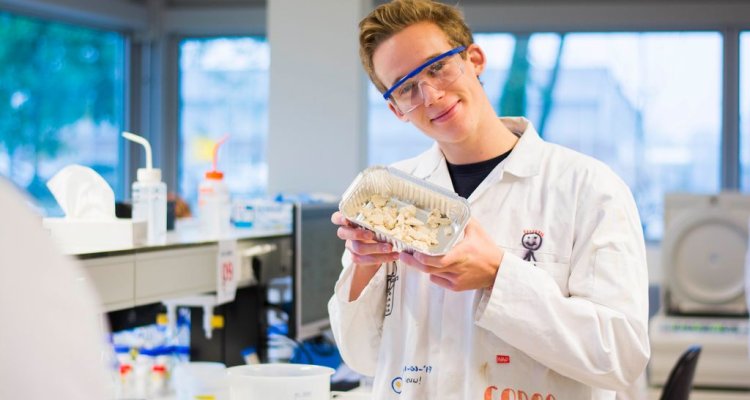
News
Food Technology programme aims to challenge students to critical thinking
WUR’s Food Technology programme does not sufficiently challenge students in the field of analytical and critical thinking as well as problem-solving skills. This is revealed by Melanie van Berkum’s PhD research.
Van Berkum is a teacher of Food Process Engineering but is also researching the Food Technology programme’s quality of education as part of her PhD trajectory. WUR strives to continuously improve its education, which is one of the reasons behind the excellent reviews it receives from students and assessment committees.
Van Berkum listed 22 competencies and asked master students, recent graduates with some working experience and professionals with over five years of experience which competencies they valued and which should be developed more. Subsequently, she interviewed graduates working in their field. This revealed that four competencies merit more attention.
Analytical thinking
'In their bachelor’s, students are insufficiently challenged to unravel significant complex issues in the food sector, for example, how food production may become more sustainable,' says Van Berkum. 'Such problems call for analytical thinking. Students must understand how the processing takes place, what stages the process has and what alternatives may be implemented, as well as the potential profits and (energy) costs. The same analytical skills are needed to fortify graduates’ problem-solving capacities, enabling them to produce a substantiated improvement plan.'
Evaluate critically
'Moreover, students must learn to critically evaluate the information provided by teachers and literature rather than accept it as the truth,' says Van Berkum. 'They must be critical of how experiments are set up and what conclusions may be drawn. At the same time, they must learn how to extrapolate incomplete information into hypotheses about a food product or process. ‘For example, students are provided with all the information about how product A is processed and are then asked to figure out how product B -about which they do not have all the information- is processed. These are questions they will frequently encounter in real-life situations, which is why it is important to practice these skills.’
The university aims to shape these competencies through problem-driven teaching in various courses. This approach has students working on complex issues in groups. However, the workgroups do not always yield the desired results, says Van Berkum. ‘Students are prone to dividing the work into tasks assigned to individuals, which prevents them from asking each other critical questions and learning together. Students must have constructive conflicts to arrive at better answers. Some friction is necessary.’
Adjustment in various courses
She is currently collaborating with the education committee to find out how the programme may fortify these competencies, and she is discussing with students how these skills may be included in the bachelor programme. ‘It often requires only a small adjustment in various courses. The assignments and courses are already outstanding, but there is room for improvement in the instructions and feedback.’